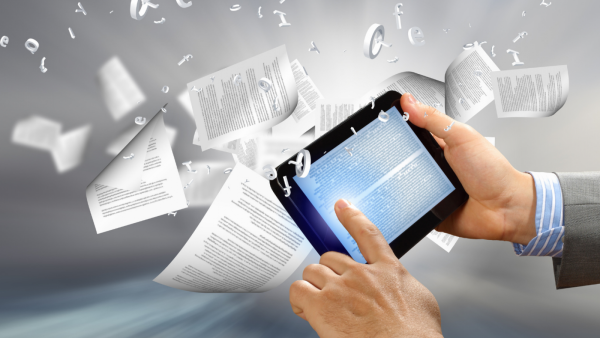In a paperless economy, where people use digital methods like computers and the internet instead of paper, there are some advantages. It can be faster to share information, save space, and help the environment by using fewer trees. Digital documents can be easily stored, searched, and shared without needing physical space for filing cabinets or storage boxes. This can make things more efficient in some ways.
Talks about how some people are moving away from using physical paper and choosing to do things digitally instead. This change can help save trees, reduce clutter, and make things more efficient.
On the other hand, in a paper economy where people rely on physical paper for work and communication, there are also benefits. Paper is easy to use without needing technology, and some people find it more comfortable to read and write on paper. It can also be more secure in some situations because it's harder for hackers to access paper documents compared to digital files.Even though many people still like using paper for work and school, more and more are switching to digital methods like electronic documents and emails. Going paperless means using computers and the internet to store and share information instead of using paper.
So, both a paperless economy and a paper economy have their own strengths and weaknesses. It really depends on the situation and what works best for each person or organization. Some tasks might be more efficient when done digitally, while others might still work better on paper. Finding a balance between the two can help us make the most of both worlds and choose the method that suits our needs best.
Both ways of doing things have their own good points. Paper is easy to touch and read without needing any technology, but making paper uses a lot of resources and takes up space. On the other hand, going paperless can help the environment and make things faster, but it might take some time to get used to.
As we move towards a future that uses less paper, it's important to understand how both paper and digital methods work. By combining the benefits of both, we can find a good balance that helps us work better and take care of our planet at the same time.
To survive in a paperless or paper economy, here are some simple points to remember:
For a Paperless Economy:
1. Learn Tech: Get comfortable using computers and the internet.
2. Stay Safe: Keep your digital information secure from online threats.
3. Back Up: Remember to save copies of your digital files.
4. Stay Organized: Keep your digital files neat and easy to find.
5. Eco-Friendly: Think about how going paperless helps the environment.
For a Paper Economy:
1. Stay Organized: Keep your paper documents in order.
2. Protect Info: Keep important papers safe and secure.
3. Store Well: Store your paper documents carefully to avoid damage.
4. Recycle: Remember to recycle paper to help the environment.
5. Be Efficient: Develop good habits to handle paper efficiently.
By following these tips, you can adapt to either a paperless or paper economy and make the most out of each method's advantages.

